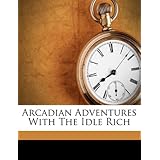
Stephen Leacock
Arcadian Adventures with the Idle Rich
100th Anniversary
A great countryman of ours: a man to thank God
for. Robertson Davies
Stephen Leacock was known as one of the finest writers in the first half of the 20th century---a spellbinding and unique Canadian version of Dickens, Twain and Swift. Leacock has been called a Tory humanist and that he was—an Anglican grounded and rooted in the best of the classical Anglican way. Most know Leacock through his kindly satire, Sunshine Sketches of a Little Town (1912), but the companion and must read novel to Sunshine Sketches is Arcadian Adventures with the Idle Rich (1914). It is the 100th anniversary in 2014 of the publication of this brilliant novel that covers religion, politics, education, economics and much else. Arcadian Adventures has more bite, more demanding social satire and deeper probes than the sweeter and gentler Sunshine Sketches, but it is imperative that the two books be seen as one---the final chapter of Sunshine Sketches, “L’Envoi: The Train to Mariposa”, points the way and is the portal into Arcadian Adventures with the Idle Rich.
Arcadian Adventures with the Idle Rich is divided into 8 readable and compelling chapters: 1) A Little Dinner with Mr. Lucullus Fyshe, 2) The Wizard of Finance, 3) The Arrested Philanthropy of Mr. Tomlinson, 4) The Yahi-Bahi Oriental Society of Mrs. Rasselyer-Brown, 5) The Love Story of Mr. Peter Spillikins, 6) The Rival Churches of St. Asaph and St. Osoph, 7) The Ministrations of the Rev. Uttermust Dumfarthing and 8) The Great Fight for Clean Government. Each chapter, again and again, punctures the façade of image and public persona, clarifies the nature of crude and subtle hypocrisy and suggests an ideal worth living towards.
The chapters, “The Rival Churches of St. Asaph and St. Osoph (6)” and “The Ministrations of the Rev. Uttermust Dumfarthing (7)” illuminate, in a brilliant and poignant manner, the rot and flabbiness in a more aesthetic notion of Anglicanism that has lost its deeper theological and public way. It is impossible to miss in Arcadian Adventures Leacock’s High Tory concern for those who are poor and marginalized and how the idle and irresponsible rich ignore the needy with a multiplicity of silly diversions and distractions (including many religious ones). Leacock makes it abundantly clear in “The Yahi-Bahi Oriental Society of Mrs. Rasselyer-Brown (4)” what happens in the human quest when spirituality cuts itself loose from the moorings of religion----when religion goes bad, though (and Leacock does spoof this within Christianity), oriental spirituality is often idealized as the answer-----Leacock is just as quick to puncture this romanticized oriental spirituality as he is debased Christian religion----there is a sort of prophetic vigor in Leacock’s insights and higher Anglican vision---such is the satirical way of such satirists such as Jonathan Swift---Leacock was, in many ways, a Canadian Tory Anglican Swift.
The deeper insights of Arcadian Adventures congeal around the economic issue and core---all is tainted and poisoned when coppers and shekels become the litmus test of a new classism, a nouveau riche that have no serious depth or commitment to a more solid religious vision, no sense of public and political responsibility to the least of these, a skewed notion of education and a calculating attitude to human relationships and friendships. In short, Leacock has little patience for the Plutorians (Pluto was the blind god of wealth) who live in their sanitized and plutocratic mausoleum, amusing themselves to death while ignoring basic human needs, justice for the needy and compassion. Leacock, as classical Tory Anglican, found such attitudes and ways of life abysmal and Arcadian Adventures of the Idle Rich satirizes such a way of life in the most graphic and not to be forgotten way. This is Anglican prophetic theology fleshed out in a literary and poignant manner.
There is something quite perennial about the themes that Leacock addresses in Arcadian Adventures, hence its relevance both in 1914 and 2014. Robertson Davies (one of the finest Canadian novelists of the 20th century and an Anglican) said of Leacock, “A great countryman of ours: a man to thank God for”. There is much more that could be said about Arcadian Adventures if space permitted--a read of the novel is best, of course-- Gerald Lynch’s Stephen Leacock: Humour and Humanity (Chapter 6: ‘Between a Vault and a Dark Place: Religion and Politics in Plutoria”) is a fine place to begin the journey into the High Tory Anglicanism of Stephen Leacock, a man, indeed, to thank God for.
Ron Dart
(with thanks to Anna Yin for tech support)

No comments:
Post a Comment